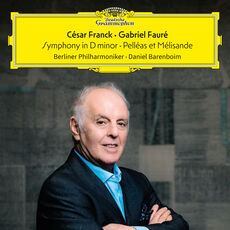
Unlimited Streaming
Listen to this album in high quality now on our apps
Start my trial period and start listening to this albumEnjoy this album on Qobuz apps with your subscription
SubscribeEnjoy this album on Qobuz apps with your subscription
Digital Download
Purchase and download this album in a wide variety of formats depending on your needs.
This recording of Daniel Barenboïm conducting the Berlin Philharmonic Orchestra closes the book, so to speak, on the love story that connects the Argentinian conductor and the famous German institution. Barenboïm first collaborated with the Berlin Philharmonic as a young pianist in 1964, masterfully performing Bartók’s Piano Concerto No.1 at just 21 years of age, at the inaugural concert of their new Philharmonic hall. Five years later, he would return to Berlin, but this time around, as a conductor, launching a very long and fruitful partnership with the orchestra and its musicians. This album, recorded during a concert held in June 2023 dedicated to French repertoire, also highlights Barenboïm’s interest in France, where he lived during his 13-year tenure at the head of the Orchestre de Paris. Yet it’s also Belgium that can be heard during this program, with the Symphony in D-minor by César Frank, from Liège, as well as Fauré’s score for Pelléas et Mélisande, composed for 1911 Nobel prize-winning Maurice Maeterlinck’s symbolist theatre play, also a Belgian-native from Ghent. Daniel Barenboïm interprets Franck’s Symphony in such a way that it feels almost Brucknerian, with slow tempos, huge contrasts, and at the heart of it all, an “allegretto“ that gives off an ineffable sense of melancholy. The ‘finale’ also takes its time, with constant tempo changes and a style that sways the piece further and further towards its Germanic roots. Then, the tone changes with the suite that Fauré had written as a commission for a London theatre production of Pelléas et Mélisande. Throughout the album, we find ourselves amidst a decidedly Germanic atmosphere of unchanging calmness that thinly veils an underlying melancholy. © François Hudry/Qobuz
Read moreYou are currently listening to samples.
Listen to over 100 million songs with an unlimited streaming plan.
From £10.83/month

Symphony in D Minor, CFF 130 (César Franck)
Berliner Philharmoniker, Orchestra, MainArtist - Cesar Franck, Composer - Daniel Barenboim, Conductor, MainArtist - Marco Buttgereit, Producer - Gregor Schweiger, Recording Engineer, StudioPersonnel
℗ 2024 Deutsche Grammophon GmbH, Berlin
Berliner Philharmoniker, Orchestra, MainArtist - Cesar Franck, Composer - Daniel Barenboim, Conductor, MainArtist - Marco Buttgereit, Producer - Gregor Schweiger, Recording Engineer, StudioPersonnel
℗ 2024 Deutsche Grammophon GmbH, Berlin
Berliner Philharmoniker, Orchestra, MainArtist - Cesar Franck, Composer - Daniel Barenboim, Conductor, MainArtist - Marco Buttgereit, Producer - Gregor Schweiger, Recording Engineer, StudioPersonnel
℗ 2024 Deutsche Grammophon GmbH, Berlin
Pelléas et Mélisande Suite, Op. 80 (Gabriel Fauré)
Gabriel Fauré, Composer - Berliner Philharmoniker, Orchestra, MainArtist - Daniel Barenboim, Conductor, MainArtist - Marco Buttgereit, Producer - Gregor Schweiger, Recording Engineer, StudioPersonnel
℗ 2024 Deutsche Grammophon GmbH, Berlin
Gabriel Fauré, Composer - Berliner Philharmoniker, Orchestra, MainArtist - Daniel Barenboim, Conductor, MainArtist - Marco Buttgereit, Producer - Gregor Schweiger, Recording Engineer, StudioPersonnel
℗ 2024 Deutsche Grammophon GmbH, Berlin
Gabriel Fauré, Composer - Berliner Philharmoniker, Orchestra, MainArtist - Daniel Barenboim, Conductor, MainArtist - Marco Buttgereit, Producer - Gregor Schweiger, Recording Engineer, StudioPersonnel
℗ 2024 Deutsche Grammophon GmbH, Berlin
Gabriel Fauré, Composer - Berliner Philharmoniker, Orchestra, MainArtist - Daniel Barenboim, Conductor, MainArtist - Marco Buttgereit, Producer - Gregor Schweiger, Recording Engineer, StudioPersonnel
℗ 2024 Deutsche Grammophon GmbH, Berlin
Album review
This recording of Daniel Barenboïm conducting the Berlin Philharmonic Orchestra closes the book, so to speak, on the love story that connects the Argentinian conductor and the famous German institution. Barenboïm first collaborated with the Berlin Philharmonic as a young pianist in 1964, masterfully performing Bartók’s Piano Concerto No.1 at just 21 years of age, at the inaugural concert of their new Philharmonic hall. Five years later, he would return to Berlin, but this time around, as a conductor, launching a very long and fruitful partnership with the orchestra and its musicians. This album, recorded during a concert held in June 2023 dedicated to French repertoire, also highlights Barenboïm’s interest in France, where he lived during his 13-year tenure at the head of the Orchestre de Paris. Yet it’s also Belgium that can be heard during this program, with the Symphony in D-minor by César Frank, from Liège, as well as Fauré’s score for Pelléas et Mélisande, composed for 1911 Nobel prize-winning Maurice Maeterlinck’s symbolist theatre play, also a Belgian-native from Ghent. Daniel Barenboïm interprets Franck’s Symphony in such a way that it feels almost Brucknerian, with slow tempos, huge contrasts, and at the heart of it all, an “allegretto“ that gives off an ineffable sense of melancholy. The ‘finale’ also takes its time, with constant tempo changes and a style that sways the piece further and further towards its Germanic roots. Then, the tone changes with the suite that Fauré had written as a commission for a London theatre production of Pelléas et Mélisande. Throughout the album, we find ourselves amidst a decidedly Germanic atmosphere of unchanging calmness that thinly veils an underlying melancholy. © François Hudry/Qobuz
About the album
- 1 disc(s) - 7 track(s)
- Total length: 01:04:42
- 1 Digital booklet
- Main artists: Berliner Philharmoniker Daniel Barenboim
- Composer: Various Composers
- Label: Deutsche Grammophon (DG)
- Genre: Classical Symphonic Music
© 2024 Deutsche Grammophon GmbH, Berlin ℗ 2024 Deutsche Grammophon GmbH, Berlin
Improve album information
 Why buy on Qobuz...
Why buy on Qobuz...
-
Stream or download your music
Buy an album or an individual track. Or listen to our entire catalogue with our high-quality unlimited streaming subscriptions.
-
Zero DRM
The downloaded files belong to you, without any usage limit. You can download them as many times as you like.
-
Choose the format best suited for you
Download your purchases in a wide variety of formats (FLAC, ALAC, WAV, AIFF...) depending on your needs.
-
Listen to your purchases on our apps
Download the Qobuz apps for smartphones, tablets and computers, and listen to your purchases wherever you go.



